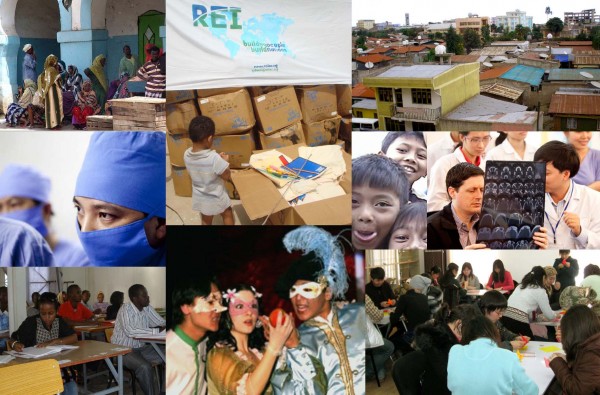
By: Donna May Lyons, REI Communications & Fundraising Assistant
Protecting the cultural diversity & historical value of world languages while promoting versus harnessing the power of progress.
It’s likely that many of us didn’t realize February 21st was International Mother’s Language Day. The observation of this annual event was proclaimed by the General Conference of the United Nations Educational, Scientific and Cultural Organization (UNESCO) in 1999 in an effort to “promote the preservation and protection of all languages used by peoples in the world.” It has been observed every year since to promote linguistic and cultural diversity and multilingualism.
Irina Bokova, Director-General of UNESCO shared the following message for the 2011 International Mother Language Day: “Information and communication technologies can be especially useful in promoting mother languages. We must harness the power of progress to protect diverse visions of the world and to promote all sources of knowledge and forms of expression. These are the threads that weave the tapestry of humanity’s story.”
An example of this concept in action can be seen in East Timor, a former province of Indonesia. On Mother Language Day 2011 the sovereign state launched a new national education policy document promoting the use of children’s mother tongues in the classroom.
According to an article by Kerry Taylor-Leech featured on the website of Language-on-the-Move, the Ministry of Education in East Timor is now considering the use of local languages (or “Children’s Mother tongue”) for teaching in pre-primary and primary schools to help children acquire the basic foundations for literacy development in their first language. A common consequence of intermingling languages is that children are often expected to learn in a language they are not familiar with or don’t use in their daily lives. The result is a decrease in literacy. According to Ms. Taylor-Leech, “There is increasing evidence showing that children whose first languages are well developed acquire literacy skills in both first and additional languages more easily. When children learn in languages they know, they are more likely to remain in school and parents are often more willing to send their children to school. Strong multilingualism and literacy offer a way to break the cycle of underachievement and low education levels, offering a way out of poverty and a pathway towards active citizenship.”
REI’s staff and volunteers work in ten emerging countries in four regions of the world. Combined, those ten countries speak over 300 languages (including regional variations). This number doesn’t take into consideration local dialects. So how does REI accomplish its humanitarian development role in the dichotomous situation of protecting the cultural diversity and historical value of world languages— like the “mother tongue” of East Timor—while also promoting the power of progress through knowledge and language sharing?
REI’s role of ‘Building people to build nations’ is a long, and often slow, process. It is accomplished patiently over time through the building of human resources and relationships, research and application, the continued development of local programs, and training the next generation of teachers and professionals. Without the support of its donor base, REI would not be able to report on the many accomplishments of its workers and volunteers including (but not limited to) the following:
- Teaching an International Relations course entirely in English at the University of Djibouti, and operating a premier local English language night school in a slum area of Djibouti.
- Training and equipping village farmers in Indonesia in the creation of a dried mango production enterprise, and creating income possibilities where none previously existed among rural, low-income Indonesian households.
- Supporting an English Language Theater group in Almaty, Kazakhstan.
- Providing support for the completion of English curriculum and books for a local language school in Kyrgyzstan.
- Establishing a local language center which offers English, Russian, Chinese, and Kyrgyz language classes, as well as an English Teacher Certification Program (also in Kyrgyzstan).
- Partnering with local leaders to build and support a kindergarten on the outskirts of Hanoi.
- Establishing a fellows program that allows Vietnamese physicians the opportunity to observe and study an American physician’s practice, and the recent exchange of a Supreme Court Justice of the Lao People’s Republic (PDR) to the United States to study alongside American legal professionals.
Protecting the cultural diversity and historical value of world languages and the people of emerging nations is vitally important. Promoting progress and building people to build nations is also of great importance. Despite the importance of teaching in the “mother language” in the early years of educational development, English is universally embraced as the “path of progress.” Virtually all international conferences are conducted in English, and, with few exceptions, nearly all REI programs begin with—teaching English! We thank you for your continued interest in and support of REI’s mission.


 Keep up with REI's work overseas by reading our blog! Subscribe by email or by feed.
Keep up with REI's work overseas by reading our blog! Subscribe by email or by feed.